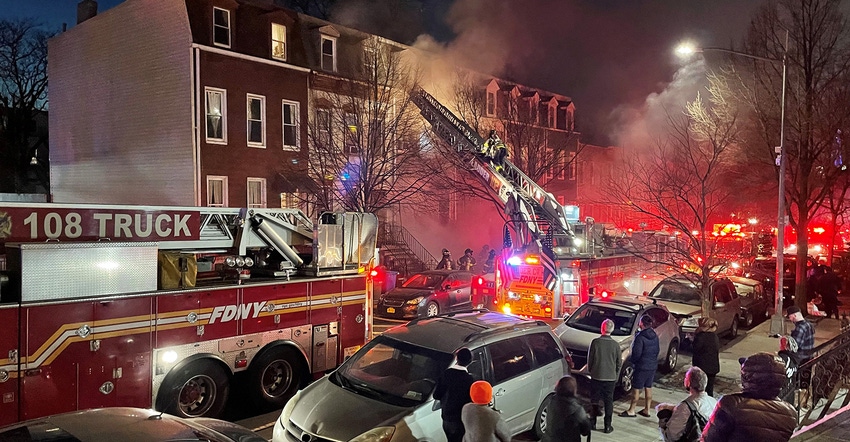How About a Battery-Swapping Scheme for Electric Bicycles in NYC?
The number of fires caused by charging batteries for electric bikes keeps increasing in New York City. Battery-swapping networks, along with changes in battery regulations and public education, could help reduce the risk of battery fires.

Electric bicycles (e-bikes) have become increasingly popular among delivery workers in New York City since their legalization in 2020. According to the City of New York, fires caused by batteries that power e-micromobility devices—e-bikes—are a significant problem in New York City (NYC), growing from 44 in 2020 to 220 in 2022.
This subject hits close to home. I am a Brooklyn resident, and a year ago, we were having dinner on a Sunday winter evening when we heard fire trucks and ambulance sirens—a very New Yorker background sound—but this time they did not go away; fire trucks were parked in front of my house. When my family and I went outside, we realized our neighbor’s house across the street was on fire and firefighters were moving quickly to stop the fire. The firefighters later told us that the neighbors had been charging e-scooter batteries in the basement of their house when the batteries caught fire. Even though the neighbors called 911 immediately, the fire spread quickly through two other house floors.
E-bike battery fires are particularly severe and difficult to extinguish, spreading quickly and producing noxious fumes. From 2021 to 2022, these fires resulted in 10 deaths and 226 injuries. In the first two months of 2023 alone, they resulted in two deaths and 40 injuries, posing a clear danger to New Yorkers when not correctly used.
While e-bikes are generally considered safe, if the batteries are not used, charged, or stored correctly, there is a risk of thermal runaway, as we have explained in previous articles. NYC is a densely populated urban area where e-bikes are a convenient alternative to car ownership and essential for delivery workers who rely on them. New Yorkers are still learning the risks of using these devices. Many e-bike owners are unaware of the risks associated with improper battery charging, and there is still a long road to finding the right solutions that fit a city like NYC. Here are some potentially feasible solutions:
Rollout of battery swapping networks across NYC
Battery-as-a-service (BaaS) or battery swapping networks are an emerging technology that is booming. It allows e-bikes owners to swap out their depleted batteries with fully charged ones quickly. According to Future Market Insights, The global battery-swapping charging infrastructure market size is expected to surpass an impressive valuation of $202.07M in 2023. It is projected to exhibit a compound annual growth rate (CAGR) of 21% from 2023 to 2033. More specifically, the two-wheeler segment dominated the industry in 2021, accounting for more than 30.00% of overall revenue.
The rollout of battery-swapping networks has seen success in China and India, and it could be successful in NYC too. One example of a successful battery swapping network in India is the SUN Mobility network. This network has been particularly successful in the electric rickshaw market, but a battery swapping network like this for e-bikes can provide high-quality battery packs and consistent power for delivery workers in NYC. Other benefits for users could include increasing the range of e-bikes and avoiding buying new UL-certified replacement batteries that could cost more than $500.

Lithium batteries regulation in NYC
New York City Mayor Eric Adams announced ”Charge Safe, Ride Safe: New York City’s Electric Micromobility Action Plan” to protect New Yorkers from fires caused by lithium-ion batteries and promote safe electric micromobility usage. The plan focuses on four key areas: promoting and incentivizing safe battery use, increasing education and outreach to electric micromobility users, advocating for additional federal regulation of these devices, and expanding enforcement against high-risk situations. In March, 2023 Mayor Adams also signed five bills into law to further regulate lithium-ion batteries sold in New York City and strengthen fire safety related to battery fires.

”Today, we are supercharging safety for all of our e-bikes and e-scooter users,” said Mayor Adams. ”These are convenient transportation options for New Yorkers, but faulty and illegal devices are making their way into our homes and streets, causing fires, and putting lives at risk. Through promoting safe devices, expanding education, increasing enforcement on high-risk situations, and pursuing additional regulation, I’m proud that New York City is leading that charge. E-bikes and e-scooters are here to stay, and with this plan and these five pieces of critical legislation I’m proud to sign, we are going to ensure that they are safe for all New Yorkers to use.”
Creating a safe and reliable charging network, new battery regulations, and public education, programs could help e-bike users in NYC follow the best battery charging and maintenance practices and therefore reduce the risks of fires caused by batteries.
About the Author(s)
You May Also Like





